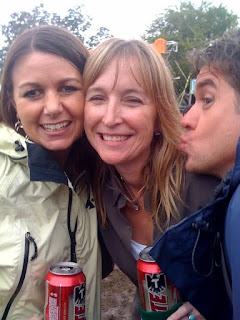
When I meet people for the first time I feel like I am keeping a secret from them. Looking at me, they would never guess what I am hiding. I can carry on an intelligent and interesting conversation without revealing the circumstance of which my new acquaintance is unaware. Depending on who they are I may even artfully dodge inquiries that would lead to the revelation of the unknown thing. I have become very good at changing the subject, saving people from embarrassing moments, and steering conversations onto safe territory.
At a recent dinner party I found myself in the uncomfortable position of answering THE question to a table of eight unsuspecting folks while we were all eating...
Guest: "So, what do you do?"
Me: "I am the director of a non-profit organization." (see how I try to give them an out?)
Guest: "Really, that is great. What kind of organization?"
Me: (tap dancing a little) "We support people grieving the loss of someone they love."
Guest: "Oh. Wow. That must be, um, rewarding."
Me: "Yes, it really is." (here I try to move the conversation to another topic, but no go.)
Guest: "Well, how did you get into this kind of work?"
**Sometimes I want to shake my head and say, you don't really want to know. But because they ask, and because I am not afraid to discuss any part of death and dying, I just take a deep breath and answer them.Me: "My husband died in an accident four years ago."
Guest: "Oh God, I am so sorry."
Me: "Thank you. My husband's death has taken me to places I would never have imagined. The work we do to create a support network all over the country has been an amazing gift."
Guest: "That is nice."
Whole table: Awkward silence and lots of chewing noises. The silence goes on until I change the subject.
I can't count how many times the above scenario has been played out, with minor variations, over the past four years. Because I don't look like a widow, right? Nothing about my external features prepares people for the shock of my marital status. The funny thing is that I often feel sorry for people who ask me an innocent question not realizing that I am about to hand them a hot potato. My husband is dead. (Toss the hot potato) Should a person hold onto the burning spud? Throw it back to me? Run for the hills tossing the hot little veggie over their shoulder as they go? And all the while they feel terrible, uncomfortable, helpless, and just plain awkward.
Initially this awkwardness made me angry. Why couldn't people treat me like a human being who was in pain? Why must they make things worse by looking at me like I just announced that I was born with two heads and was hiding one under my coat? How nice that this person I didn't even know has the luxury of turning a blind eye to the fact that death happens?
After a couple of years I became tired. I was exhausted from dealing with my own feelings about Phil's death and did not have any desire to deal with the death discomfort of anyone else--especially a stranger. When asked a question about my "status" I gave a vague answer. If a conversation headed in a "dangerous" direction, I abandoned ship. Taking the road of least resistance helped me avoid the embarrassing tears that still crept up if I was sideswiped by having to say the words, actually my husband is dead.
These days I have no fear of awkwardness, though I do still take a deep breath before tossing the hot potato. I have become accustomed to the variety of responses my widowed status elicits. Rarely do I find myself too tired to do the tap dance that assures people that I don't mind talking about my grief experience. Often I leave a conversation having provided someone with a new outlook on the concept of creating a support network for grieving people. I have become a collector of stories, and have been gifted with some amazing tales of love, courage, and compassion.
But the most important change that has occurred for me is that I am now able to share my story without expecting anything from the person listening. I don't need them to approve of how I grieve. I don't wonder if they left our conversation with an understanding of how much I loved Phil. I don't care whether or not they think I am "over it." I get that most people are incapable of understanding the unique, and yet universal, pain of loss. And I no longer wish they could. Because one day they will. And on that day, with some luck, a bit of determination, and a lot of support from people around the world, that little non-profit organization that is a direct result of the death of my husband will be around to support them from the moment grief walks into their life.
There may be a day when someone I talked to at a dinner party recalls meeting a girl who didn't look like a widow telling them that help exists for grieving people. If they remember just that much than Phil's death won't be reduced to just an inexplicable tragedy.




































